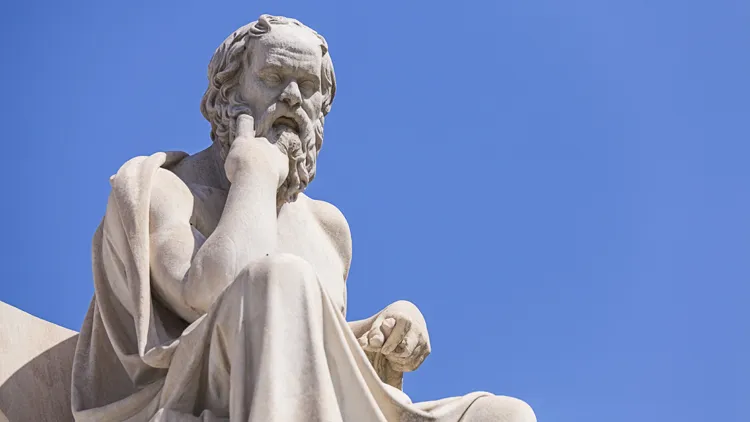500 and an Athenian citizen sit in court. The accused is a 70 year old inhabitant of the city, the great philosopher Socrates. The accusations are that Socrates is breaking the law, that he denies the existence of the gods recognized in this city and that he is seducing young people with his words and ideals. For the chief plaintiff Militos is certain that the punishment due to the philopher is death.
How was it possible that Socrates had to face a degrading public trial? Why does a man who has spent his life talking to his fellow citizens in search of truth attract such hostility?
Socrates was born around 469 before Christ in Alopeke, a suburb of Athens. His father Sophroniskos is a respected sculptor, his mother Phainarete works as a midwife, the family belongs to the upper middle class.
The young Socratis learned the art of sculpture from his father, but never practiced his profession. His passion was philosophy and he followed his mother. As a child sees the light of the world with the help of a midwife, so Socrates always tries to bring the truth to light in conversations. Not with the effect achieved by the writings of scholars, but rather by spreading his philosophical approach only in conversations with friends, with students and with the citizens of Athens.
But thanks to his students, we know a lot about Socrates, especially Plato draws the dialogues in four books, a detailed picture of his teacher.
Whenever Socrates is on the move in public places, stadiums and halls, he seeks dialogue with people through an urgent question, a supposed knowledge as ignorance. Socrates is out to involve his counterpart in contradictions. He often uses the medium of irony, his tone is mischievous, he is not interested in sticking out his arguments in fights and counter-arguments against his opponent, for Socrates the pointing out of logical contradictions is only a means to the end. He wants to lead people to recognize the truth for themselves.
In his eyes, this means first of all questioning what he believes to be certain and admitting his own ignorance.
Socrates says of himself:
All I know is that I know nothing.
This sounds more modest than it is at the end of the day, because he sees himself one step ahead of his fellow citizens.


 Part 2
Part 2 

